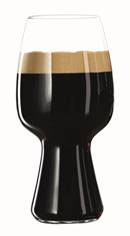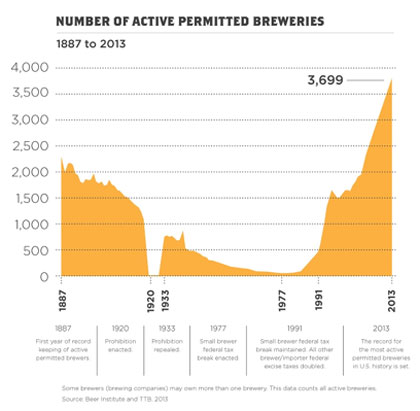The Brewers Association Board of Directors has approved changes to its statements of purpose, mission, core values and beliefs, as well as its definition of craft brewer.
“The changes to fundamental elements of our industry were undertaken with significant deliberation and consideration of many voices,” Paul Gatza, Brewers Association director, said for a press release explaining the changes. “In November 2013, at the board’s direction, the BA surveyed our voting brewery members regarding the ‘foundational documents’ of our association. The results gave us ample member input on these matters of critical importance as the Board headed into its strategic planning meeting.”
The press release outlined what has changed.
Purpose
Slightly revised, the Brewers Association now states its purpose as: To promote and protect American craft brewers, their beers and the community of brewing enthusiasts.
“In spirit and action, our purpose remains unchanged,†said board chair Gary Fish of Deschutes Brewery. “Removing the previous reference to ‘craft beers’ — which the Brewers Association does not define, but rather leaves to the beer enthusiast — allows the focus to remain on the craft brewers the BA works to promote and protect.”
Mission
The Brewers Association mission now states:
By 2020, America’s craft brewers will have more than 20 percent market share and will continue to be recognized as making the best beer in the world. We will:
– Promote access to raw materials and markets
– Support research and advances in safety, sustainability, education, technology and raw materials
– Exercise political influence to secure fair legislative and regulatory treatment
– Foster the commitment to quality
– Educate consumers to understand and champion beer from craft brewers
– Cultivate new ideas and a commitment to a living and active beer culture among craft brewers, homebrewers and beer enthusiasts
“The 20-by-‘20 objective is an aspirational goal for our craft community, with an inspiring symmetry. I’m convinced this goal is within our reach if we, as an industry, continue to focus on our strengths and passions—making and delivering high-quality, innovative, full-flavored beer to craft beer enthusiasts,” Fish said.
Core Values & Beliefs
The Brewers Association core values & beliefs are now described as follows:
– Promoting and celebrating the small, independent, traditional and innovative culture of American craft brewers
– Vigorously defending our industry and providing craft brewers with a unified voice
– Fostering transparency within our own organization
– Supporting and encouraging the responsible enjoyment of beer
– Providing stewardship for 10,000 years of brewing history
– Educating brewers and consumers about the diversity, flavor and quality of beer
– Improving the economic health of American craft brewers
– Working to build a collegial community of brewers, homebrewers and brewing enthusiasts
– Promoting ethical and legal trade practices
– Building relationships and collaborating with our industry partners
Among the changes, the word “innovative” was added to the first bullet point.
Craft Brewer Definition
The three pillars of the craft brewer definition remain the same; however, under the BA Board’s direction, some elements of each pillar have been modified to reflect the evolution within the industry. Specifically, the craft brewer definition now states:
An American craft brewer is small, independent and traditional.
– Small: Annual production of 6 million barrels of beer or less (approximately 3 percent of U.S. annual sales). Beer production is attributed to the rules of alternating proprietorships.
– Independent: Less than 25 percent of the craft brewery is owned or controlled (or equivalent economic interest) by a beverage alcohol industry member that is not itself a craft brewer.
– Traditional: A brewer that has a majority of its total beverage alcohol volume in beers whose flavor derives from traditional or innovative brewing ingredients and their fermentation. Flavored malt beverages (FMBs) are not considered beers.
Small
While the “small†component of the craft brewer definition previously encompassed the flavored malt beverage (FMB) exclusion—as FMBs are not beer—that language is now contained within the traditional segment of the definition, where it more appropriately applies. The update also added a parenthetical “(approximately 3 percent of annual U.S. sales),” which gives context to the small percentage that 6 million barrels or less of annual production represents vis-a-vis overall beer industry sales.
Independent
The revised language more tightly aligns with common beverage alcohol terminology used throughout the beer, wine, spirits and FMB businesses.
Traditional
The revised definition recognizes that adjunct brewing is quite literally traditional, as brewers have long brewed with what has been available to them.
“The revisions to the craft brewer definition reflect the evolution in thinking regarding the elements of the definition. As the industry continues to rapidly advance, so must the framework that upholds and reflects it,” Gatza said.
 Glassware maker Spiegelau had collaborated with two breweries known for making excellent stouts to lanuch the first stout-specified beerglass. The Spiegelau x Left Hand Brewing Company x Rogue Ales Stout Glass was developed over a yearlong series of design workshops and tasting panels led by Riedel crystal glassware owner Georg Riedel and Spiegelau vice president Matthew Rutkowski. Eric Wallace of Left Hand Brewing Company, Brett Joyce of Rogue Ales and experts from each brewery tested a selection of stouts ranging from Rogue Ales’ Shakespeare Oatmeal Stout to Left Hand Brewing Company’s Milk Stout.
Glassware maker Spiegelau had collaborated with two breweries known for making excellent stouts to lanuch the first stout-specified beerglass. The Spiegelau x Left Hand Brewing Company x Rogue Ales Stout Glass was developed over a yearlong series of design workshops and tasting panels led by Riedel crystal glassware owner Georg Riedel and Spiegelau vice president Matthew Rutkowski. Eric Wallace of Left Hand Brewing Company, Brett Joyce of Rogue Ales and experts from each brewery tested a selection of stouts ranging from Rogue Ales’ Shakespeare Oatmeal Stout to Left Hand Brewing Company’s Milk Stout.
